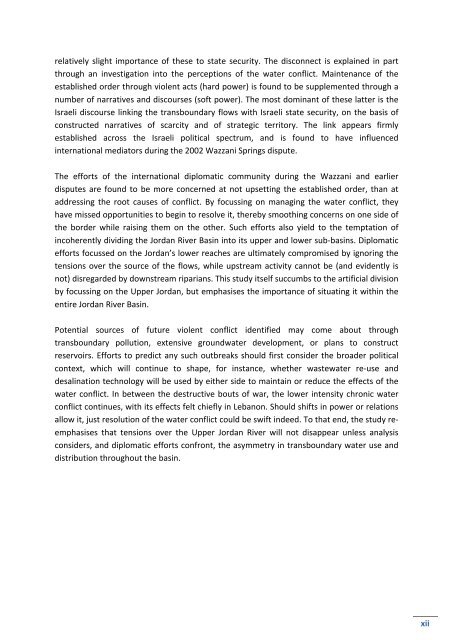Hydro-‐political Baseline of the Upper Jordan River - Ibrahim Abd El Al
Hydro-‐political Baseline of the Upper Jordan River - Ibrahim Abd El Al
Hydro-‐political Baseline of the Upper Jordan River - Ibrahim Abd El Al
You also want an ePaper? Increase the reach of your titles
YUMPU automatically turns print PDFs into web optimized ePapers that Google loves.
elatively slight importance <strong>of</strong> <strong>the</strong>se to state security. The disconnect is explained in part<br />
through an investigation into <strong>the</strong> perceptions <strong>of</strong> <strong>the</strong> water conflict. Maintenance <strong>of</strong> <strong>the</strong><br />
established order through violent acts (hard power) is found to be supplemented through a<br />
number <strong>of</strong> narratives and discourses (s<strong>of</strong>t power). The most dominant <strong>of</strong> <strong>the</strong>se latter is <strong>the</strong><br />
Israeli discourse linking <strong>the</strong> transboundary flows with Israeli state security, on <strong>the</strong> basis <strong>of</strong><br />
constructed narratives <strong>of</strong> scarcity and <strong>of</strong> strategic territory. The link appears firmly<br />
established across <strong>the</strong> Israeli political spectrum, and is found to have influenced<br />
international mediators during <strong>the</strong> 2002 Wazzani Springs dispute.<br />
The efforts <strong>of</strong> <strong>the</strong> international diplomatic community during <strong>the</strong> Wazzani and earlier<br />
disputes are found to be more concerned at not upsetting <strong>the</strong> established order, than at<br />
addressing <strong>the</strong> root causes <strong>of</strong> conflict. By focussing on managing <strong>the</strong> water conflict, <strong>the</strong>y<br />
have missed opportunities to begin to resolve it, <strong>the</strong>reby smoothing concerns on one side <strong>of</strong><br />
<strong>the</strong> border while raising <strong>the</strong>m on <strong>the</strong> o<strong>the</strong>r. Such efforts also yield to <strong>the</strong> temptation <strong>of</strong><br />
incoherently dividing <strong>the</strong> <strong>Jordan</strong> <strong>River</strong> Basin into its upper and lower sub-‐basins. Diplomatic<br />
efforts focussed on <strong>the</strong> <strong>Jordan</strong>’s lower reaches are ultimately compromised by ignoring <strong>the</strong><br />
tensions over <strong>the</strong> source <strong>of</strong> <strong>the</strong> flows, while upstream activity cannot be (and evidently is<br />
not) disregarded by downstream riparians. This study itself succumbs to <strong>the</strong> artificial division<br />
by focussing on <strong>the</strong> <strong>Upper</strong> <strong>Jordan</strong>, but emphasises <strong>the</strong> importance <strong>of</strong> situating it within <strong>the</strong><br />
entire <strong>Jordan</strong> <strong>River</strong> Basin.<br />
Potential sources <strong>of</strong> future violent conflict identified may come about through<br />
transboundary pollution, extensive groundwater development, or plans to construct<br />
reservoirs. Efforts to predict any such outbreaks should first consider <strong>the</strong> broader political<br />
context, which will continue to shape, for instance, whe<strong>the</strong>r wastewater re-‐use and<br />
desalination technology will be used by ei<strong>the</strong>r side to maintain or reduce <strong>the</strong> effects <strong>of</strong> <strong>the</strong><br />
water conflict. In between <strong>the</strong> destructive bouts <strong>of</strong> war, <strong>the</strong> lower intensity chronic water<br />
conflict continues, with its effects felt chiefly in Lebanon. Should shifts in power or relations<br />
allow it, just resolution <strong>of</strong> <strong>the</strong> water conflict could be swift indeed. To that end, <strong>the</strong> study re-‐<br />
emphasises that tensions over <strong>the</strong> <strong>Upper</strong> <strong>Jordan</strong> <strong>River</strong> will not disappear unless analysis<br />
considers, and diplomatic efforts confront, <strong>the</strong> asymmetry in transboundary water use and<br />
distribution throughout <strong>the</strong> basin.<br />
xii


